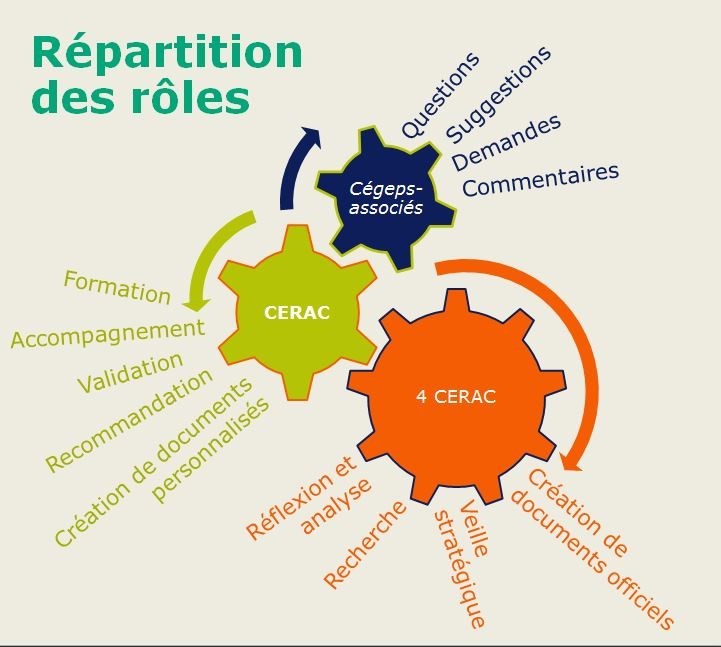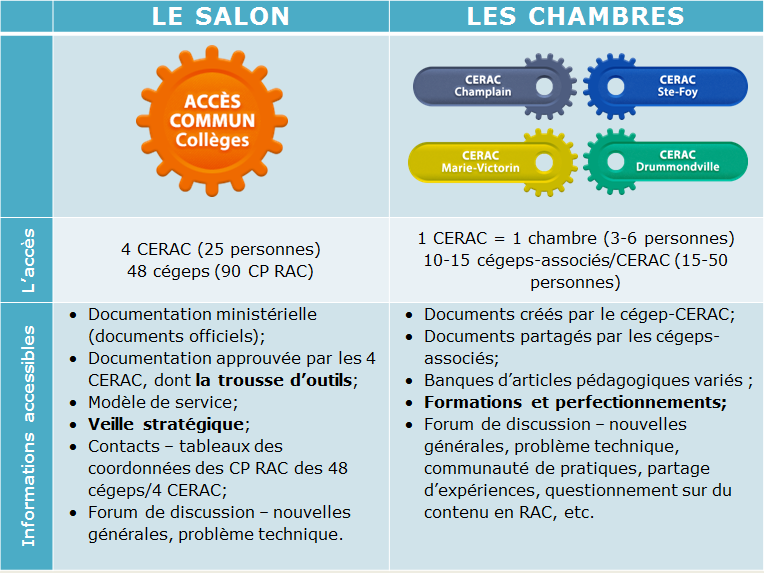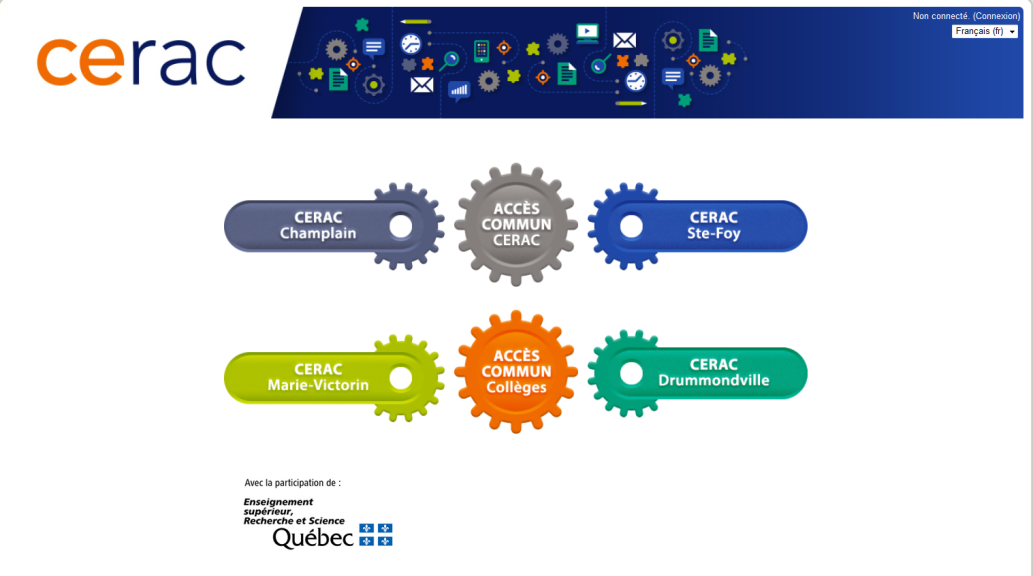Moodle Platform Moderating the CERAC Community of Practice

At the Sommet sur l’Enseignement supérieur, in February 2013, it was announced that four CERACs (Centre d’expertise en reconnaissance des acquis et des compétences) would be created within the college network. The CEGEPs awarded a CERAC were: Cégep de Drummondville, Cégep de Ste-Foy, Cégep Marie-Victorin and Champlain Regional College. Over the last year, my colleagues and I have worked to design and develop a virtual space for communication and collaboration between these centers using Moodle (LMS). The goal was to create and support an online community of practice. The platform provides a space to bring together hundreds of pedagogical advisors in Recognition of Acquired Competencies (RAC), nearly twenty employees of the four CERACs and representatives from MESRS (Ministère de l’Enseignement supérieur, de la Recherche et de la Science).
The purpose of this article is to share our project with the college network, a project that revolves around an innovative interface. The transformed Moodle platform brings to mind the imagery of a house with a guest room, sitting room, children’s room and a master bedroom.
The Basic Goals of CERAC
In the initial stages of the project, the CERAC working group which consists of eight people from the four CERACs as well as two representatives from MESRS, developed and disseminated a needs assessment survey. The purpose of the survey was to collect data about the needs and expectations of professionals working in RAC and how the CERACs could most effectively contribute to their success. The results collected from all 48 public colleges were compiled, analyzed and presented to MESRS. The following is a short list of some of the expectations of the CERACs expressed by respondents:
- Provide support and advice
- Create a space for professional exchange
- Provide training and professional development
- Conduct research and strategic planning in RAC
- Enhance the quality and credibility of RAC services at the college level

With the rules of operation clear, the mandate of the CERACs began to take concrete operational steps
The MESRS established and mandated the CERACs to provide support to the provincial college network in order to assist in the improvement and expansion of Recognition of Acquired Competencies services. The following three objectives are the core mandate of the CERACs:
- Objective 1: Grow and expand RAC services
- Objective 2: Improve the quality of the service offered
- Objective 3: Contribute to the further development of RAC
With the rules of operation clear, the mandate of the CERACs began to take concrete operational steps. One of the first challenges taken on by the CERACs was the persistent feeling of isolation expressed by the majority of pedagogical advisors who work on the RAC dossier, especially by those who are located in colleges in the regions of the province. It seemed logical to provide a supportive solution through the use of technology. Thus, the idea of creating an online community of practice was born.

Our intended community of practice for RAC stakeholders
The Moodle platform contained all the elements necessary to fulfill the following functions:
- It is accessible to MESRS
- It is well established within the college system (although not all continuing education departments use Moodle)
- Pre-existing technical support through the DECclic Corporation
The CERAC Moodle Platform – A Unique Interface
The team at cégep Drummondville took charge of the design of the community of practice. Between November 2013 and January 2014, the design team consisted of one pedagogical advisor and two techno-pedagogical advisors, one of whom was a Moodle administrator and a graphic designer. Together, this team designed and created the shell of the platform which would be the basic structure.
The interface buttons demonstrate the interrelated connection between the work of CERACs and the associated colleges they serve.
The interface of the CERAC platform is unique in the college system of Quebec. In order to make the Moodle interface more user and reader friendly, the home page of the CERAC platform was designed as a large house in which there is a large master bedroom, four children’s rooms and a big sitting room. Each room is unique in its design since they all have differing needs. The result is that the 4 CERACs and MESRS have their own room (a master bedroom which is represented on the Moodle chart below as Accès Commun CERAC or CERAC Common Access), the 48 public colleges have been assigned a room with their respective CERAC children’s rooms which are represented on Moodle by the names of the 4 CERACs) and finally, all stakeholders can exchange and share in the living room which is represented on Moodle as the French equivalent of Colleges’ Common Access, notably Accès Commun Collèges.
When a user views the platform they do not see a list of courses open for registration which is typical of a Moodle platform. Rather, users have immediate access to their respective CERAC room where they will find pertinent information. Although the design is visually appealing, this Moodle platform should not be confused with a website!

CERAC Moodle Platform isn’t a website
Two implementation phases
At the end of January 2014, employees of the MESRS and within the CERACs received their access codes to log onto the platform. From that moment, twenty-five users started to become familiar with the platform’s environment, how to communicate with each other through discussion forums, how to exchange and post documents and make mutual decisions in Accès Commun CERAC.
In order to add collective information, two CERACs took the lead to develop material for the platform. CERAC Ste-Foy initiated on a project to post a tool kit that includes dozens of generic forms and documents that were donated by all associated colleges. These documents facilitate the work of RAC advisors who often need to develop such in-house materials. CERAC Champlain Saint-Lambert took the lead to develop an inventory of research in the field of RAC and all current research opportunities. This information can be found in the Accès Commun Collèges.

Four sections of the platform
Each CERAC has a responsibility to “furnish and decorate” their respective room according to the nature of their expertise. From February to June, all CERACs were tasked to create resources for the platform both in their respective spaces as well as in common areas such as Ressources documentaires. The CERACs were also strongly encouraged to use the Forum as a place for online discussion.
The final step of phase one was to create a contact list of pedagogical advisors in RAC. The access codes to the CERAC platform were generated using this contact list. Due to the sensitivity of the project, the registration of users was done manually.
The second phase of implementation was the official launch of the CERAC platform which took place at the conference of the AQPC (Association Québécoise de Pédagogie Collégiale) in June 2014. The workshop provided a guided tour of the Moodle CERAC platform to hundreds of RAC advisors throughout the province.
Creating a Helpful Routine
What is the motivation for this project? The CERACs are hoping that pedagogical advisors in RAC use the platform on a daily basis, visiting the CERAC platform to find all the needed information and support they are looking for to work at maximum efficiency. Although adult education has become globally important and RAC has been an important social consideration for several years, it remains that in most cases it’s all about people … and members of the community of practice gather and help each other working for the same goal: to provide a quality service to adults wishing to gain recognition of their prior learning and skills. We hope, the CERAC Platform will contribute to strengthen the RAC skills of dedicated pedagogical advisors throughout our beautiful province.

